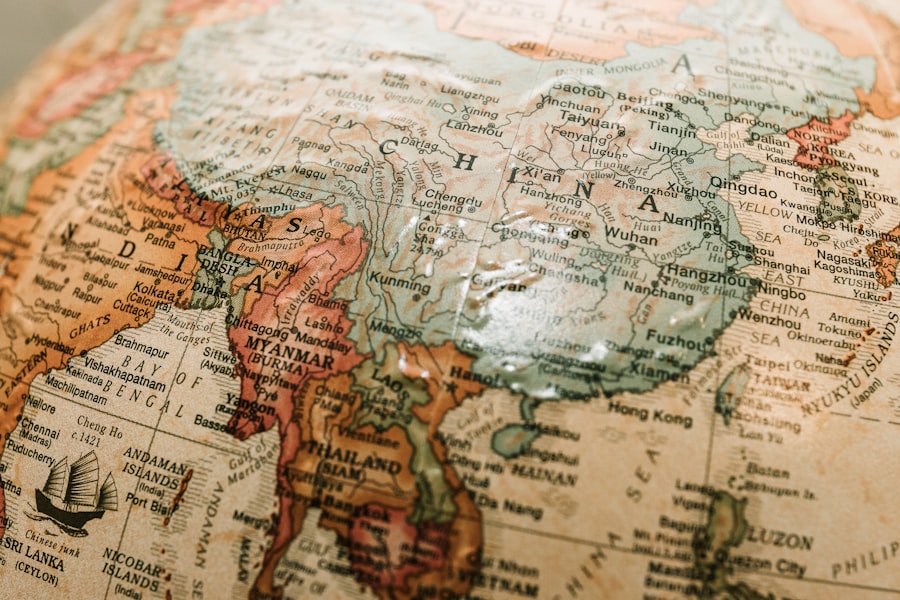Geopolitical hotspots are regions of the world that are characterized by significant political tension, conflict, or instability. These areas often become focal points for international attention due to their potential to affect global peace and security. The term encompasses a variety of situations, from territorial disputes and civil wars to economic crises and humanitarian disasters.
Understanding these hotspots requires a nuanced analysis of the historical, cultural, and socio-economic factors that contribute to their volatility. For instance, regions like the South China Sea, the Middle East, and Eastern Europe have been identified as hotspots due to their strategic importance and the complex interplay of local and international interests. The dynamics within these hotspots are often influenced by a multitude of actors, including nation-states, non-state actors, and international organizations.
Each player has its own agenda, which can complicate efforts to achieve stability. The interplay of nationalism, ethnic tensions, and external interventions often exacerbates existing conflicts, making resolution challenging. As such, a comprehensive understanding of geopolitical hotspots necessitates an examination of both the immediate issues at hand and the broader historical context that shapes them.
Key Takeaways
- Geopolitical hotspots are areas of intense political and military conflict, often driven by competing national interests and historical grievances.
- Geopolitical hotspots can have a significant impact on global stability, leading to economic disruptions, humanitarian crises, and potential military conflicts.
- Strategies for navigating geopolitical hotspots include diplomatic negotiations, economic sanctions, and military interventions, depending on the specific circumstances.
- Diplomacy plays a crucial role in managing geopolitical hotspots, as it allows for peaceful resolution of conflicts and the establishment of international agreements.
- Geopolitical hotspots can have far-reaching economic implications, affecting trade, investment, and global supply chains.
The Impact of Geopolitical Hotspots on Global Stability
Geopolitical hotspots have far-reaching implications for global stability. When tensions escalate in these regions, they can lead to conflicts that spill over borders, affecting neighboring countries and even distant nations. For example, the Syrian civil war has not only resulted in a humanitarian crisis but has also led to a refugee influx into Europe, straining resources and creating political backlash in host countries.
Such scenarios illustrate how localized conflicts can have global repercussions, highlighting the interconnectedness of modern geopolitics. Moreover, geopolitical hotspots can disrupt international trade and economic stability. Areas experiencing conflict often see a decline in foreign investment and trade relations, which can have cascading effects on global markets.
The ongoing tensions in the South China Sea, for instance, threaten vital shipping routes that are crucial for international commerce. As nations grapple with the implications of these hotspots, they must navigate a complex landscape where local conflicts can trigger broader economic instability.
Strategies for Navigating Geopolitical Hotspots

Navigating geopolitical hotspots requires a multifaceted approach that balances immediate responses with long-term strategies. One effective strategy is the establishment of diplomatic channels that facilitate dialogue among conflicting parties. By promoting communication and understanding, nations can work towards de-escalating tensions and finding common ground.
This approach often involves third-party mediation, where neutral countries or organizations help facilitate discussions aimed at conflict resolution. In addition to diplomacy, economic strategies can also play a crucial role in stabilizing geopolitical hotspots. Economic incentives, such as development aid or trade agreements, can encourage cooperation among conflicting parties.
By addressing underlying economic grievances, nations can reduce the likelihood of conflict and foster a more stable environment. Furthermore, engaging local communities in development initiatives can empower them and create a sense of ownership over their future, thereby contributing to long-term peace.
The Role of Diplomacy in Managing Geopolitical Hotspots
| Geopolitical Hotspot | Diplomatic Approach | Outcome |
|---|---|---|
| Middle East | Multilateral negotiations | Peace agreements and ceasefires |
| South China Sea | Engagement with regional stakeholders | Conflict de-escalation |
| Ukraine | Diplomatic sanctions and dialogue | Stabilization of the region |
Diplomacy is an essential tool in managing geopolitical hotspots, serving as a means to prevent conflicts from escalating into violence. Through diplomatic engagement, countries can express their concerns, negotiate terms, and seek peaceful resolutions to disputes. High-level summits and bilateral talks often serve as platforms for leaders to address contentious issues directly.
The success of such diplomatic efforts hinges on the willingness of all parties to engage in constructive dialogue and compromise. Moreover, multilateral diplomacy through international organizations can amplify efforts to manage geopolitical hotspots. Institutions like the United Nations play a critical role in facilitating discussions among member states and providing frameworks for conflict resolution.
Peacekeeping missions and diplomatic interventions are often deployed in hotspots to maintain stability and protect civilians. However, the effectiveness of these efforts can be hampered by political divisions among member states or lack of resources.
Economic Implications of Geopolitical Hotspots
The economic implications of geopolitical hotspots are profound and multifaceted. Conflicts in these regions can lead to significant disruptions in trade and investment flows, impacting not only local economies but also global markets. For instance, sanctions imposed on countries embroiled in conflict can isolate them economically, leading to increased poverty and instability.
This economic isolation often exacerbates existing tensions and can create a cycle of violence that is difficult to break. Additionally, geopolitical hotspots can attract foreign investment aimed at exploiting natural resources or strategic advantages. While this investment can stimulate local economies, it can also lead to exploitation and exacerbate existing inequalities.
The competition for resources often fuels conflicts between local populations and foreign entities, further complicating the geopolitical landscape. Thus, understanding the economic dimensions of geopolitical hotspots is crucial for developing effective strategies for stabilization.
The Influence of Geopolitical Hotspots on International Relations

Geopolitical hotspots significantly influence international relations by shaping alliances and rivalries among nations. Countries often align themselves with specific factions or governments based on strategic interests or ideological affinities. This alignment can lead to the formation of blocs that either support or oppose certain regimes or movements within a hotspot.
For example, the ongoing tensions between Russia and NATO have been exacerbated by events in Ukraine, leading to a re-evaluation of security policies across Europe. Furthermore, geopolitical hotspots can serve as testing grounds for international norms and laws. The response of the global community to crises in these regions often reflects broader trends in international relations, such as the emphasis on human rights or the principle of sovereignty.
As nations navigate these complex dynamics, they must balance their national interests with their commitments to international law and humanitarian principles.
Case Studies: Geopolitical Hotspots Around the World
Examining specific case studies of geopolitical hotspots provides valuable insights into the complexities of international relations. The Middle East serves as a prominent example, where historical grievances, religious tensions, and external interventions have created a volatile environment. The Israeli-Palestinian conflict remains one of the most enduring disputes in modern history, with deep-rooted issues that continue to challenge peace efforts.
Another significant case study is the South China Sea, where territorial disputes between China and several Southeast Asian nations have raised concerns about regional stability. The strategic importance of this maritime region for global trade has drawn attention from major powers like the United States, leading to heightened military presence and diplomatic tensions. These case studies illustrate how localized conflicts can have broader implications for international relations and global stability.
The Role of International Organizations in Addressing Geopolitical Hotspots
International organizations play a crucial role in addressing geopolitical hotspots by providing platforms for dialogue and mechanisms for conflict resolution. The United Nations is perhaps the most prominent example, with its peacekeeping missions aimed at stabilizing conflict zones and protecting civilians.
In addition to peacekeeping efforts, international organizations also facilitate diplomatic negotiations aimed at resolving disputes peacefully. Organizations like the African Union or the European Union have been instrumental in mediating conflicts within their respective regions. By fostering cooperation among member states and promoting shared interests, these organizations contribute to long-term stability in geopolitical hotspots.
Balancing National Interests and Global Cooperation in Geopolitical Hotspots
Navigating geopolitical hotspots requires a delicate balance between national interests and global cooperation. While countries may prioritize their own strategic objectives, they must also consider the broader implications of their actions on global stability. This balancing act is particularly challenging in situations where national interests conflict with humanitarian concerns or international norms.
For instance, nations may be reluctant to intervene in a hotspot due to fears of entanglement or backlash from other countries. However, failing to address emerging crises can lead to greater instability that ultimately affects national security interests. Thus, finding common ground through diplomacy and collaboration becomes essential for managing geopolitical hotspots effectively.
The Role of Media in Shaping Perceptions of Geopolitical Hotspots
The media plays a pivotal role in shaping public perceptions of geopolitical hotspots by framing narratives around conflicts and crises. Coverage of these regions often influences public opinion and government responses to international issues. Sensationalized reporting can exacerbate fears or misconceptions about certain areas, leading to polarized views that complicate diplomatic efforts.
Moreover, social media has transformed how information is disseminated and consumed, allowing for real-time updates from conflict zones. While this immediacy can raise awareness about humanitarian crises, it can also contribute to misinformation or propaganda that distorts public understanding of complex situations. As such, responsible media reporting is essential for fostering informed discussions about geopolitical hotspots.
The Future of Geopolitical Hotspots: Trends and Projections
Looking ahead, the landscape of geopolitical hotspots is likely to evolve as new challenges emerge on the global stage. Climate change is increasingly recognized as a driver of conflict, with resource scarcity leading to tensions over water rights or arable land. As environmental issues intersect with traditional geopolitical concerns, nations will need to adapt their strategies accordingly.
Additionally, technological advancements may reshape how conflicts are fought and resolved. Cyber warfare and information manipulation are becoming prominent tools in modern geopolitics, complicating traditional notions of state sovereignty and security. As nations grapple with these evolving dynamics, understanding the future trajectory of geopolitical hotspots will be crucial for maintaining global stability.
In conclusion, geopolitical hotspots represent complex challenges that require careful navigation through diplomacy, economic strategies, and international cooperation.
In the ever-evolving landscape of global politics, understanding geopolitical hotspots is crucial for comprehending the dynamics that shape our world. A related article that delves into this topic can be found on MyGeoQuest, a platform dedicated to exploring geographical and political issues. For a deeper insight into current geopolitical tensions and their implications, you can read more about it on their sample page. This article provides a comprehensive analysis of various regions that are currently experiencing significant political and social upheavals, offering readers a nuanced perspective on the factors driving these conflicts.
WATCH NOW! Unlocking Disaster: 7 Choke Points That Could Fracture Our Connected World Overnight
FAQs
What are Geopolitical Hotspots?
Geopolitical hotspots are areas of the world where political, economic, and military tensions are high, and where conflicts or disputes have the potential to escalate into larger-scale confrontations.
What are some examples of Geopolitical Hotspots?
Some examples of geopolitical hotspots include the Korean Peninsula, the South China Sea, the Middle East (particularly Syria and Yemen), Ukraine, and the India-Pakistan border.
What factors contribute to the emergence of Geopolitical Hotspots?
Factors that contribute to the emergence of geopolitical hotspots include territorial disputes, ethnic or religious tensions, competition for resources, power struggles between nations, and historical animosities.
How do Geopolitical Hotspots impact global stability?
Geopolitical hotspots can impact global stability by creating uncertainty in financial markets, disrupting trade and supply chains, and potentially leading to military conflicts that have the potential to draw in other countries and destabilize entire regions.
What are some strategies for managing Geopolitical Hotspots?
Strategies for managing geopolitical hotspots include diplomatic negotiations, international mediation, economic sanctions, peacekeeping missions, and efforts to promote dialogue and reconciliation between conflicting parties.
